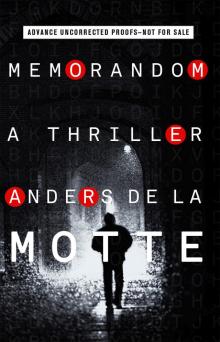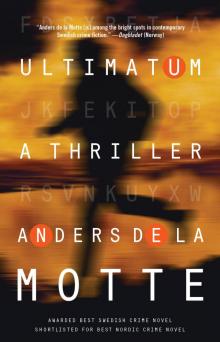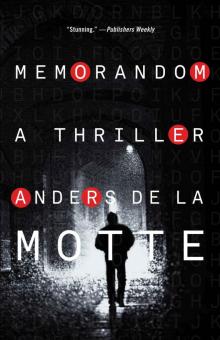- Home
- Anders de la Motte
Buzz: A Thriller Page 6
Buzz: A Thriller Read online
Page 6
His arm was outstretched and the shiny revolver was aimed straight at her.
The gun was even bigger than she remembered it—the barrel looked like a deep, pitch-black well.
She screwed her eyes shut, tensed her body, and waited for the shot.
But nothing happened.
Why didn’t he shoot?
When she opened her eyes again everything had changed.
It was as if the cloud of dust, the man, and his gun had never existed.
A dream within a dream . . .
Instead she was standing in the middle of a desert.
No matter what direction she looked in, identical sand dunes stretched out, all the way to the horizon.
In the distance some dark birds were slowly circling. Around and around above the same point in the desert sand.
When she woke up with the sheets sticking to her body, the image of those black birds was still ingrained on her retinas.
“Bad omens,” she muttered to herself, without really knowing why.
♦ ♦ ♦
The pavilion was empty. He was lying alone among the cushions, and the water pipe had gone out.
Outside the whole camp was bathed in white light.
The large floodlights had been lit and he could see people running about across the open space. The music had fallen silent, he could hear shouting in different languages, but his brain was groggy and he couldn’t make out what was being said.
Then he heard the sound of an engine approaching—a muffled, pulsing noise. It sounded like a helicopter, possibly more than one? His head felt like a lump of concrete, his tongue was sticking to the roof of his mouth, and when he tried to get up he found that his body didn’t seem to want to obey him.
The engine sound got louder and louder, and a sudden gust of wind made the drapes around him blow violently. He brushed the fabric aside and took a couple of stumbling steps toward the entrance.
At that moment he discovered to his surprise that his tourist garb was gone and that he was once again wearing his soaking-wet silk shirt from Thailand.
For a few seconds he began to suspect that everything that had happened in the camp had all been in his imagination.
That the dance, the ominous bird, the whispering voice, and everything else were just details from a hash dream that he had just woken up from.
It wasn’t until he staggered out into the light and people started pointing at him that he realized that his shirt was drenched in blood.
6
DOUBLE DEALING
Pillars of Society forum
Posted: 11 November, 09:13
By: MayBey
All good police officers end up facing an official investigation sooner or later . . .
This post has 32 comments
“INTERVIEW WITH POLICE Inspector Rebecca Normén concerning suspected misuse or gross misuse of office during an event that occurred in Darfur Province in western Sudan on 8 November.
“The purpose of this interview is primarily to gather information. Conducting the interview are Inspectors Walthers and Westergren from the National Police Complaints Commission. Also present is Normén’s witness for the defense, Superintendent Ludvig Runeberg.”
Walthers was an overweight man in his fifties who looked like a kindly uncle and had a twinkle in his eye as he sat back and adjusted the microphone on the table between them.
Misuse of office. She’d had to get out a copy of the criminal code when she received the summons, if only to check that the whole thing wasn’t some sort of absurd joke.
But no, the first paragraph of chapter twenty of the penal code was definitely no laughing matter:
A person who in the exercise of public authority by act or by omission, intentionally or through carelessness, disregards the duties of his office, shall be sentenced for misuse of office to a fine or imprisonment for at most two years.
Then, a little farther down the same page:
If a crime mentioned in the first paragraph has been committed intentionally and is regarded as gross, a sentence for gross misuse of office to imprisonment for at least six months and at most six years shall be imposed. In assessing whether the crime is gross, special attention shall be given to whether the offender seriously abused his position or whether the crime occasioned serious harm to an individual or the public sector or a substantial improper benefit.
At first she wasn’t even going to mention it to her boss, just get the interview out of the way and then forget about it. It ought to be a purely routine matter—after all, she had done her job and not done anything wrong. At least that was what she kept trying to convince herself . . .
But Runeberg already seemed to know that she had been summoned to an internal investigation and suggested that he come along as a witness.
“It’s only a fact-finding interview. I’m not actually under suspicion for anything, Ludvig,” she protested.
“That’s what they want you to think, Normén. Almost all internal investigations begin with fact-finding. That’s to make you feel safe and encourage you to help them, one colleague to another. Then all of a sudden you’ve said too much, a prosecutor appears, and before you know it you’re facing official charges. Remember that internal investigators aren’t like the rest of us. They’ve got their own agenda!”
And now here they all were in the interview room . . .
The only question was: Who was responsible for her ending up there?
There was hardly any shortage of suspects.
♦ ♦ ♦
A small, tiled room that smelled of bleach, a bunk, a table, and two chairs that were fixed to the floor—that was all.
Somewhere in the distance an air conditioner rumbled into action and soon he felt a cold stream of air against his bare back.
They had removed all his clothes apart from his underpants, and it was only a matter of minutes before he started shivering.
His head was aching and even if he was presumably back in the city, his mouth still felt like it was full of desert sand.
The whole thing was pretty much a dense cloud of fog, interspersed with just a few random sequences of images. The cops’ helicopter landing beside the camp, commando yells, people all shouting at the same time.
In the next clip his hands were cuffed behind his back and he had been tied to one of the seats.
He must have passed out again, because he couldn’t remember much of the actual flight.
He was in pretty desperate need of some clothes, a cup of Java, and a warm shower—but most of all an explanation for what the hell was going on!
He was freezing his ass off in there, which was fucking ironic seeing as it was probably thirty degrees outside.
Two minutes after his teeth started chattering uncontrollably the door opened and a plump, mustached little man in a neatly pressed beige uniform walked in.
The man put a gray folder on the table, then sat down on the chair opposite HP. He opened the folder, slowly took out a pair of reading glasses from his breast pocket, and began to read.
“E-e-e-embasssssy,” HP stammered. “N-need embass-ssy, but you haven’t got a cluuue what I’m s-s-saying, have y-y-you? I h-have rights, you know, r-r-rights!”
“Oh, I can understand what you’re saying perfectly well,” the man replied, and his faultless English brought HP up with a start.
“The problem is that I don’t know which embassy I should contact. Certainly not the Norwegian Embassy, seeing as your passport is fake.”
He looked at HP over his thin glasses.
“My name is Sergeant Aziz; I’m a detective with the Royal Dubai Police. So, who are you really?”
He looked curiously at HP.
“We haven’t managed to find any information at all about your true identity, neither on you, nor among your belongings at the hotel. It’s tempting to think that you don’t actually exist. And a man who doesn’t exist . . .”
The police officer leaned across the table.
“ . . . can’t have any rights—can he?”
♦ ♦ ♦
“So, Normén, to sum up: you arrived at the scene and found the approach road blocked by a crowd. Instead of unloading and walking to the building with bodyguards and an escort of government soldiers, you decided to abort the operation. Am I right so far?”
“You’re forgetting the attacker,” she interjected, getting more and more annoyed by the lead interviewer’s sarcastic tone of voice.
Westergren turned and gave his colleague a long look.
“But he didn’t show up until you were back in your vehicles?”
“No. I caught sight of him while we were standing there—before I made the decision to abort.”
“And was he armed then?” This from nice, bald, little Uncle Walthers, and she turned toward him.
“No, not then. He was carrying a bag and I thought I could see a glimpse of a gun in it.”
“Thought? A glimpse? You weren’t sure?”
Westergren again, still with the same irritating tone. She took a deep breath.
“Like I’ve already said, I thought it was a gun. Everything was happening very fast, it’s impossible to say exactly what happened when . . .”
“We appreciate that, Rebecca.” Walthers nodded. “But we’d still like you to try to break down the sequence of events as much as you can, down to the very smallest detail. That will help us understand everything better, because obviously neither Per nor I were there.”
He nodded toward his colleague and gave her another friendly smile that she couldn’t help reciprocating.
“It happened exactly the way I keep telling you. We arrived, stopped, then, while I was trying to evaluate the situation, I caught sight of the assailant in the crowd. After watching him for a few seconds I concluded that the situation was so threatening that both our charge and my team itself were in danger, and as a result I made the decision to abort.”
She gave Walthers a relieved smile, then glanced at Runeberg. Her boss’s face wasn’t giving anything away. He was sitting there with his arms folded, watching the two men on the other side of the table.
“And then what happened, Rebecca?” Walthers went on gently.
“We began to move backward and the crowd started to go mad. They got through the cordon and chaos broke out. I was almost knocked off my feet but managed to stay upright and draw my pistol. Then the firing started . . .”
“You were firing at live targets?” Westergren snapped, quick as a cobra, but she didn’t take the bait.
“No, I fired warning shots—three, to be precise, but because it wasn’t possible to fire at the ground because of the risk of hitting third parties I was obliged to fire into the air. At about the same time someone else, probably the soldiers in among the crowd, opened fire.”
Walthers gestured to her to go on.
“I saw, or maybe heard, people being hit by gunfire, panic broke out, and people started running in all directions. We carried on reversing. I was caught between the car and the door and that’s when he came running up.”
“The assailant, you mean?”
“Exactly.”
“You wrote in your report that he was running in front of the car, and that you saw him reach for his gun and draw it. That you considered firing at him, but that your visibility and the movement of the car made that impossible . . .”
“Exactly,” she repeated, more impatiently this time. They had been through the whole sequence of events several times now, and it had all been recorded. What was it they didn’t understand?
“Rebecca, could it have been like this—and I’m merely raising this as a possibility, one colleague to another . . .”
Walthers peered at her from over the top of his reading glasses.
“Considering that none of the other bodyguards or anyone else at the scene noticed any assailant—might it have been the case that the stressful situation and limited visibility were affecting your judgment? That you might have been mistaken with regard to the attacker?”
She opened her mouth to reply but he interrupted her.
“No one here would think that strange. Quite the contrary.” He gestured toward the others in the room.
“We all know what it’s like when the adrenaline kicks in. You get tunnel vision and focus on individual details that really need to be seen in a broader context. A cell phone becomes a hand grenade, a camera becomes a revolver . . . That sort of thing has happened before. Could that have been what happened in this case, Rebecca?”
She opened her mouth to reply, but Runeberg put his hand on her knee. Clearly she had underestimated the kindly uncle. Even if he wrapped things up nicely, he was still the one trying to trick her into making some kind of admission.
She took a deep breath.
“It really isn’t my place to comment on what anyone else saw or didn’t see. I can only speak for myself,” she said as calmly as she could, and noticed Walthers’s friendly smile slowly fade away.
“I saw an attacker and a weapon, a clear danger to both our charge and my team, so I responded accordingly in line with my duty.”
She gave Runeberg a quick sideways glance and was rewarded with a nod of encouragement. Disappointed, Walthers looked down at his papers and Westergren took over.
“What’s your response to the fact that people died at the scene, Normén? In all likelihood as a direct consequence of your dubious actions . . .”
Rebecca jerked. She had realized that people must have been hurt, possibly even killed when the soldiers opened fire—but having it thrown in her face like this was an entirely different matter. To judge from the expression on Westergren’s face, he didn’t care if he’d crossed a boundary.
“Once again . . .” she said, as calmly as she could even though her anger was bubbling closer and closer to the surface. “I made my evaluation based upon the threat to my team and the person in my charge. I can’t take responsibility for what anyone else did or didn’t do.”
“So you’re saying you don’t care that people were being killed around you?”
“Of course I’m not!” she snapped, but before she could go on Runeberg interrupted her.
“Where are you trying to get with these questions, Westergren?”
The two men stared at each other.
“Interview witnesses must stay silent during interviews,” Walthers piped up from the side, but neither of them looked at him.
“I’m interested in whether or not Police Inspector Normén really understands that one of the consequences of her questionable actions was that people died. That she directly or indirectly caused their deaths by provoking the soldiers to open fire.”
“That’s out of order, Per . . .”
“Is it really, Ludvig? Maybe you should pay a bit more attention to the sections of the penal code dealing with misuse of office instead of spending so much time in the gym?”
Runeberg slowly stood up, and Westergren did the same.
“Okay, let’s all just calm down,” Walthers quacked. He stood up as well and, with some difficulty, placed himself between the two men.
“Interview suspended at 09:51 for a short break.”
♦ ♦ ♦
He had spent something like three days in this cell. At least he thought he had. Sleeping on the wooden bunk, shitting in a bucket, and trying to pass the time as best he could. And obviously he was so desperate for a cigarette he felt he was going to explode. But at least he had been given some clothes.
A white T-shirt and a pair of orange overalls that were at least two sizes too small.
During the first few hours he had quite literally shat himself in terror, but as he gradually came around and ate and drank something, the fog began to disperse and he started to piece a few things together.
He had been seriously doped up when the cops arrested him, and now they had also worked out his passport was fake. But even if both crimes were pretty serious down here, they still didn’t quite warrant this sort of trea
tment.
There was something that didn’t make sense . . .
♦ ♦ ♦
“What the hell was that all about?” She glowered at Runeberg as her boss fiddled absentmindedly with the coffeemaker.
“Nothing special . . .”
“Oh, come on! You were about to start fighting in there, you and Westergren . . . So you know each other?”
Runeberg nodded reluctantly.
“Per and I were beat cops at the same time, a long time ago, and he was a difficult bastard even then—not very collegial, if you get what I mean?”
She shrugged in reply.
“So?”
Runeberg sighed.
“He applied to join the Security Police a few years ago and when I was asked about it I advised against his appointment. Somehow he found out and ever since then he’s been waiting for a chance to get back at me. I had a feeling he’d jump on this case. I mean, how often does a bodyguard end up in Police Complaints?”
“So that was why you suggested coming along? To play at being my guardian?”
He muttered something in reply.
“I appreciate the thought, but it would have been better if you’d told me this at the start . . .”
He nodded.
“You’re quite right—I should have. But everyone makes mistakes, don’t they?”
He gave her a long look that she was still trying to interpret when they were called back into the interview room.
“We’ve outlined the case to the prosecutor . . .” Walthers began. “The usual procedure in cases like this is that we inform your boss in writing of any decisions, and then he or she would take the necessary action until the investigation is concluded.”
Westergren butted in.
“But now we’re in the fortunate position of having your boss here with you as a witness to the proceedings, so we can tell you both that as of now, Normén, you are officially under suspicion of misuse of office, and possibly gross misuse.”
He grinned and nodded to Runeberg.
“Superintendent Runeberg will inform you about what is going to happen now, but in cases where an officer is suspected of misconduct during the course of their duties, there isn’t really much choice. The new rules are crystal clear. Maybe you’d like to take it from here, Ludvig . . . ?”

 Rites of Spring
Rites of Spring Game: A Thriller
Game: A Thriller End of Summer
End of Summer Buzz: A Thriller
Buzz: A Thriller The Game Trilogy
The Game Trilogy Bubble: A Thriller
Bubble: A Thriller MemoRandom
MemoRandom Ultimatum
Ultimatum MemoRandom: A Thriller
MemoRandom: A Thriller